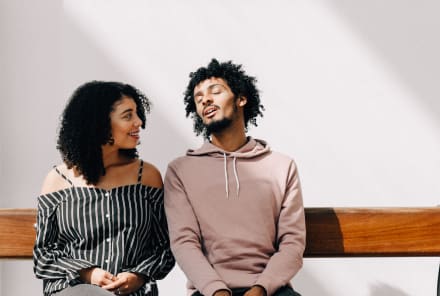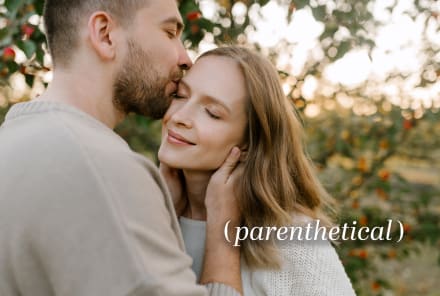Advertisement
Why The 'Safe' Choice Is A Great One When It Comes To Relationships


From a young age, we're taught that in a relationship, "safe" is just another word for "boring." In TV shows and movies, time and time again, we see people being offended when their partner describes them as "safe," acting like it means they're settling.
But why is "safe" considered a bad thing?
With women now more than ever being given a voice to speak out about abuse of all kinds that they've experienced in relationships, it's time to change the narrative of safe relationships to a positive one. A safe relationship is one that is mutually beneficial, loving, trusting, and—well—safe from partner abuse. It also means feeling safe to take on the world, knowing you have someone by your side that is there for you. It's an exciting, amazing relationship that brings you joy.
For so many reasons, the safe choice is the good choice when it comes to relationships.
"Safe" does not mean "boring."
Why are we so stuck on the idea that safe relationships are a snooze fest? Sex therapist Shadeen Francis, LMFT, tells mindbodygreen that it often comes back to being addicted to the thrill of intensity. "If you are used to a certain threshold of stress and energy, when things are quiet or calm or safe, they can feel boring," she says. "We are creatures of habit, so we habituate to our physical and emotional environments. While this helps us to adapt and get comfortable, if we are accustomed to constant change and activity, we will need more and more of it over time, the same way that if you always eat spicy food, over time you will need more and more heat to get the kick."
It's up to us to break that association of calm and boring.
When it comes down to it, safe is really just another word for secure and a cornerstone of a healthy, committed relationship. "Feeling secure is one of the main factors that contributes to long-term love," Maria Sullivan, dating expert and vice president of Dating.com, tells mindbodygreen. "Couples who consider stability 'boring' may not be in the right relationship to begin with. The end goal of embarking on a relationship is to find the soul you connect with most—once you find that, there's no way it could be boring."
Unfortunately, the message being put out there is that mysterious and unpredictable is sexy in a way reliable and supportive isn't. Honestly though, what is sexy about someone who is flaky and isn't there when you need them? Absolutely nothing. But finding someone whom you can grow with and depend on through your deep connection? Now that is as hot as it gets. Seriously, being with someone in your daily life—and intimately—whom you trust and can be yourself with? It's unlike anything else.
In fact, humans are instinctively drawn to safe relationships, Francis says. "We know that evolution has primed us to seek relationships where our partners are reliable and help us meet our needs because these relationships have always helped us survive. The people we are attached to in this way help us lower our anxiety, be more vulnerable, and take new risks because we have a secure base," she explains. "A 'safe' relationship provides just that, a foundation from which people can then build the confidence to go out into the world knowing they have support, encouragement, and a soft landing to return to."
The fact that many of us today have created new associations with the word "safe" suggests we have a lot of unhelpful unlearning to do. The first step?
Be aware of how you label your relationships.
Remember that it's only the way you define your relationship's characteristics that matters. "Language creates experience. The words we use to define an experience ultimately create the experiences we have in the future," Francis says. "To call a relationship exciting primes our body for excitement. To call a relationship safe, depending on how we define the word, could either cue up feelings of boredom or stagnation or feelings of comfort and reassurance."
These labels are also open to change over time as a relationship changes, for better or worse. "Categorizing a relationship is not helpful, as relationships continuously evolve. If you feel that the foundation of your relationship is strong, then remain confident that this scenario is right for you. And if a relationship is boring to you, then it may be time to re-evaluate your partner and consider someone new," Sullivan says.
Evaluating whether you're bored in a relationship is completely separate from it being safe or not. "Safety allows your system to relax. Your vigilance decreases, and this makes way for trust and, ultimately, vulnerability. Safe relationships allow you to lock in and engage with your partner without the fears or obstacles that disconnect us when we feel unsafe," Francis says. "Boredom can promote disconnection if not used strategically, such as as a birthplace for curiosity or creativity. When people are bored with their relationships, they usually choose one of two strategies: doing things to create emotional intensity to reignite that 'spark,' or seeking excitement elsewhere."
How to know if you're in a safe relationship.
When you're in a safe, happy relationship, those doubts and insecurities you've felt before may not always go away completely, but, man, will they dim. You'll feel cared for, supported, and respected. While you and your partner will undoubtedly have off days when one of you has to give more to the relationship than the other, overall you'll make each other's lives better.
If you want to determine whether you're in a safe relationship, Francis recommends asking yourself questions like:
- How do you usually feel when you are with this person?
- When you think about them, what emotions come up?
- What do you feel when the two of you are disagreeing or trying new things?
Be honest with your answers: "If feelings related to your experience of safety come up, such as (trust, reliability, security, affirmation, togetherness, support, affirmed, care, etc.) then you are in a safe relationship," she says. In contrast, feelings of fear, anger, and resentment are signs that you're not. You should never be scared of your partner or worried about how they might react to something. Also, if you're always apologizing for your partner, or everyone in your life disapproves, there's likely a real reason for that.
Choose to give your time and love to someone else only when they give it back and respect you completely, Sullivan says, "Look for someone who consistently shows you respect and values you—if these are qualities that you can depend on in your relationship, then odds are you'll always feel fulfilled."
At the end of the day, you're strong and powerful all on your own. Bringing a partner into your life isn't a necessity. If you do, the right partner will support you through their words and actions, making your life feel better and, yes, beautifully safe.
Watch Next
Enjoy some of our favorite clips from classes
Enjoy some of our favorite clips from classes
What Is Meditation?
Mindfulness/Spirituality | Light Watkins
Box Breathing
Mindfulness/Spirituality | Gwen Dittmar
What Breathwork Can Address
Mindfulness/Spirituality | Gwen Dittmar
The 8 Limbs of Yoga - What is Asana?
Yoga | Caley Alyssa
Two Standing Postures to Open Up Tight Hips
Yoga | Caley Alyssa
How Plants Can Optimize Athletic Performance
Nutrition | Rich Roll
What to Eat Before a Workout
Nutrition | Rich Roll
How Ayurveda Helps Us Navigate Modern Life
Nutrition | Sahara Rose
Messages About Love & Relationships
Love & Relationships | Esther Perel
Love Languages
Love & Relationships | Esther Perel
What Is Meditation?
Box Breathing
What Breathwork Can Address
The 8 Limbs of Yoga - What is Asana?
Two Standing Postures to Open Up Tight Hips
How Plants Can Optimize Athletic Performance
What to Eat Before a Workout
How Ayurveda Helps Us Navigate Modern Life
Messages About Love & Relationships
Love Languages
Advertisement

The 4 Pillars That Lead To Long-Lasting Relationships, From A Marriage Counselor
Rachel Glik, Ed.D., LPC

The 4 Pillars That Lead To Long-Lasting Relationships, From A Marriage Counselor
Rachel Glik, Ed.D., LPC









